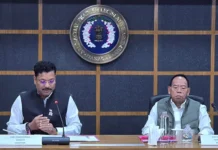Flights Of Fantasy
[ M Panging Pao ]
A few days back, on 5 September, the nation celebrated Teachers’ Day in honour of Bharat Ratna Dr Sarvapalli Radhakrishnan, who was India’s second president and a scholar/philosopher. In Arunachal Pradesh also, Teachers’ Day is celebrated throughout the state with cultural functions and programmes in different schools and colleges.
Teachers have a major impact on our lives. Most people may not remember important people like the richest person of the world, prime ministers, presidents, MLAs, MPs, etc. However, most people remember their teachers, especially the teachers of primary and middle schools. In many cases, teachers are the first role models for children. Being at an impressionable age, many young children look up to their teachers and want to emulate them in character, etiquette and behaviour.
Teachers have the onerous task of educating and grooming our children from a very young age. Many teachers perform this important role under demanding circumstances. Many schools do not have basic amenities like electricity, water, and toilets; there is lack of quarters, and, in a few cases, some teachers are not paid salaries for months. In a few remote corners of our state, teachers have to walk for a few days to reach the schools in the villages.
However, are teachers the only professionals to take on this onerous responsibility of educating and grooming our next generations? Can parents, elders and the society shy away from this responsibility? Most schools provide just academic education to our children. Many parents expect that, once children are in school, it is the teacher’s responsibility to educate and groom them. The responsibility of grooming our children to transform them into responsible citizens of the nation must be shared by parents, elders and society.
All teachers teach the children to be honest, disciplined and sincere. Children are taught these important values by teachers. But many children pick up bad traits like cheating, theft, arrogance, etc, from parents, relatives and society. In the olden days, to groom our children well, there was a book on moral values. Today, it is assumed that most students are honest, possess good character and thus the formal lessons on moral values have been removed from the syllabi in many schools.
The profession of teaching is so noble and attractive that many successful professionals opt for teaching post retirement. The former president of India, APJ Abdul Kalam, went back to teaching after retiring. Other such teachers include Rabindranath Tagore and Albert Einstein. Even in Arunachal and the Northeast, certain professionals and senior citizens are voluntarily taking classes in schools/colleges.
One baffling aspect is the growing preference for private schools by parents and children. Though government schools are well-funded and teachers paid relatively well, why are many children joining numerous private schools mushrooming in numerous towns? It is a challenge for the government to stem this increasing migration to private schools by improving the standards and performance. Do you agree? (The contributor is retired Group Captain, Indian Air Force)


